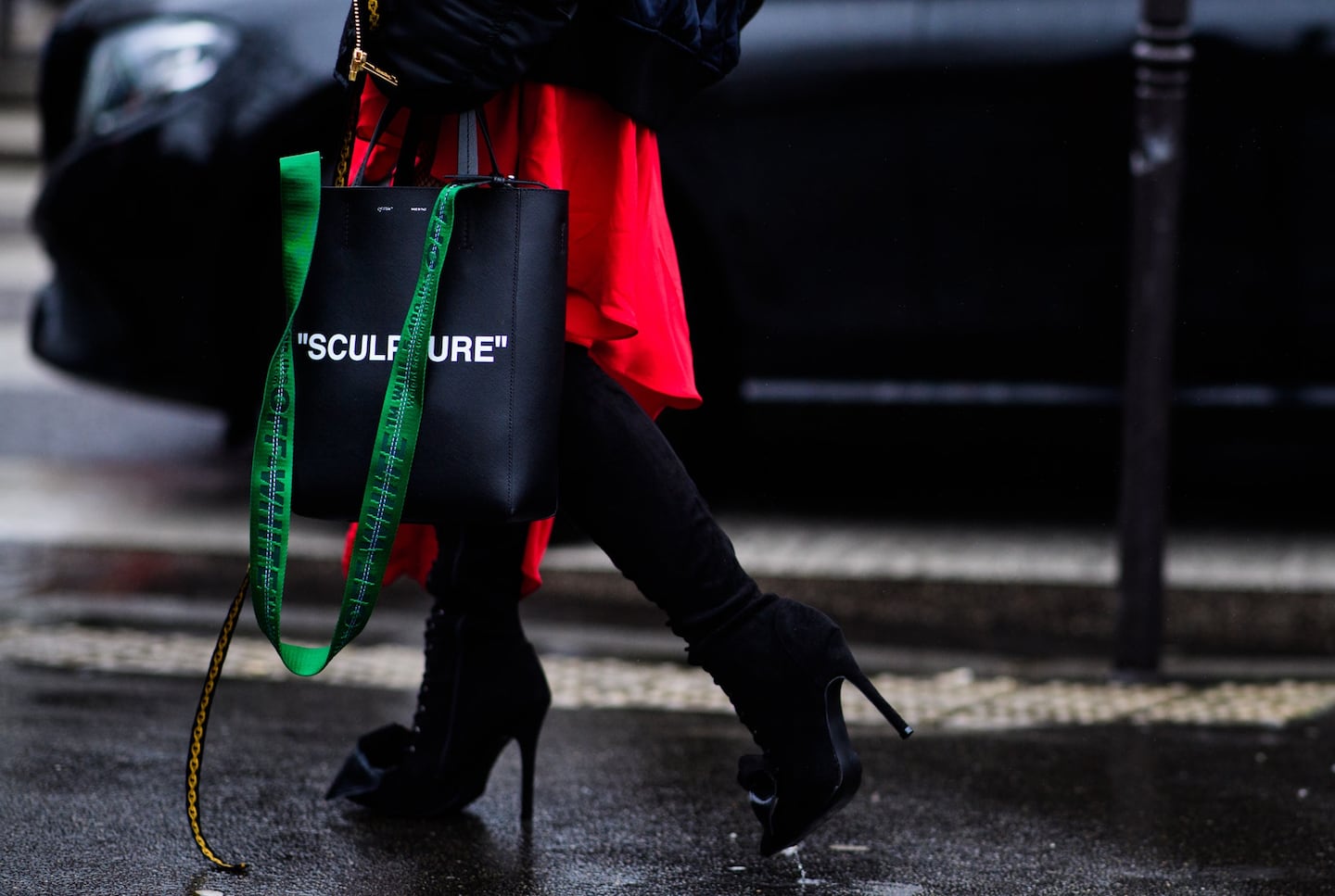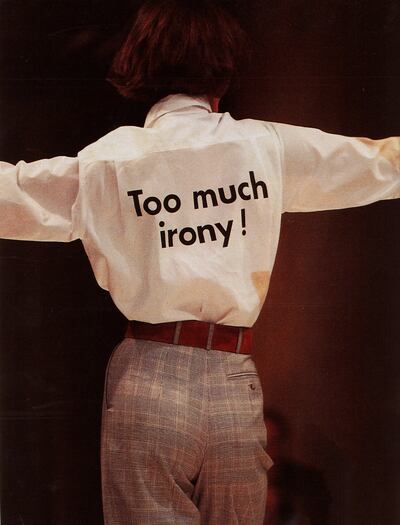
The Business of Fashion
Agenda-setting intelligence, analysis and advice for the global fashion community.

Agenda-setting intelligence, analysis and advice for the global fashion community.

Since "The Rise of the Fashion Hipster," there's been a slew of articles identifying irony as the key aesthetic driver of contemporary fashion. Certainly, irony is at the heart of the work of designers like Jeremy Scott at Moschino, Demna Gvasalia at Vetements and Balenciaga and Virgil Abloh at Off-White.
Abloh has taken irony to new heights by simply putting the name of the product he has created in quotation marks on the thing itself (i.e. "little black dress" printed on a little black dress). One need not be an art scholar to see this as a fairly obvious nod to the infamous 1928 Rene Magritte painting "The Treachery of Images," which depicted a smoking pipe with the words: "Ceci n'est pas une pipe."
And while that painting said something — namely that images can be deceiving — Abloh's inversion of this principle, that the thing is exactly the thing, even in quotation marks, does not actually say much. The best case that can be made for this kind of facile irony is also the worst case: here is the thing either way you slice it, so you might as well buy it from me.
Many fashion commentators have called today's use of irony "fresh." But the fact is: irony in fashion is nothing new — what’s new is the rise of the next generation of fashion consumers who may not possess historical knowledge of fashion, and to whom irony seems fresh.
ADVERTISEMENT
Much of what we are witnessing in contemporary fashion is a revival of the 1990s, when the current generation of ironic designers were teenagers awed by what they were seeing on the catwalk. And, low and behold, in the 1990s there was a strong undercurrent of irony in fashion.
Irony was the weapon of choice for those who longed to escape the mind-numbing banality of contemporary culture.
Here are some examples. At a Spring/Summer 1991 show of Moschino, a model comes out wearing a white dress shirt with the words "Too Much Irony!" printed on the back.
Moschino again; in a Spring/Summer 1994 show a model wears a hanger on her head and a plastic garment bag with "Aeffe" — Moschino's manufacturer — printed on it. This is not a far cry from Demna Gvasalia's "Kering" hoodie shown in his second men's Balenciaga collection in 2017.
Dolce & Gabanna, Spring 1992: a male model sports a "Sicilians are Sensational" T-shirt, complete with what today would be a heart emoji. Even Hussein Chalayan, who usually took himself seriously, sent a dress down his Spring/ Summer 2006 runway with the Absolut vodka logo on it. Other examples abound, but I will stop here.

Moschino Spring/Summer 1991 | Source: Courtesy
That irony entered fashion in the 1990s makes total sense — Generation X was the first generation of well-educated people who also grew up watching ungodly amounts of TV, commercials included. It was the first generation who had to dodge salesmen at every waking moment of their lives, but who were also simultaneously defined by branding, for the simple fact that it became inescapable. American writer, David Foster Wallace, the most brilliant commentator Generation X has produced, noted that it seemed perfectly normal for his generation to align brands with character traits. These were mimetic shortcuts that simply became second nature in an ad-saturated culture.
Irony was the weapon of choice for those who longed to escape the mind-numbing banality of contemporary culture. But the marketing departments of big corporations and ad firms they used also hired smart young people, and the first principle of marketing is that you need to speak the language of the consumers. Therefore, irony quickly entered the parlance of TV and advertising, and so the last escape hatch was closed.
Fast-forward to today and the internet seems simply like another version of TV, and the millennial generation does not seem all that far removed from Gen X in its attitudes towards many aspects of contemporary culture. The millennials are still described as supposedly hard to sell to, because they have sucked in advertising with their mothers' milk. They still play the cat-and-mouse game with the ad men. "Authenticity" is still suggested as the main value of Instagram influencers hired to peddle product, despite the fact that authenticity and marketing are antithetical by nature.
ADVERTISEMENT
How long this cycle will continue is anybody's guess. I would argue that it won't be long before irony as the prevailing aesthetic and consumption attitude will fall away. Wallace rightly noted that irony is a defeatist attitude because it's not a constructive one. Irony is tiring because there is a certain cynicism at its core, despite it's wink-wink enthusiasm, and because humans do have a constructive mindset. But will irony be rediscovered at some point by a future generation of fashion designers and consumers? You bet.
Eugene Rabkin is a New York-based writer and the founder of Stylezeitgeist.com.
The views expressed in Op-Ed pieces are those of the author and do not necessarily reflect the views of The Business of Fashion.
Related Articles:
From analysis of the global fashion and beauty industries to career and personal advice, BoF’s founder and CEO, Imran Amed, will be answering your questions on Sunday, February 18, 2024 during London Fashion Week.
The State of Fashion 2024 breaks down the 10 themes that will define the industry in the year ahead.
Imran Amed reviews the most important fashion stories of the year and shares his predictions on what this means for the industry in 2024.
After three days of inspiring talks, guests closed out BoF’s gathering for big thinkers with a black tie gala followed by an intimate performance from Rita Ora — guest starring Billy Porter.